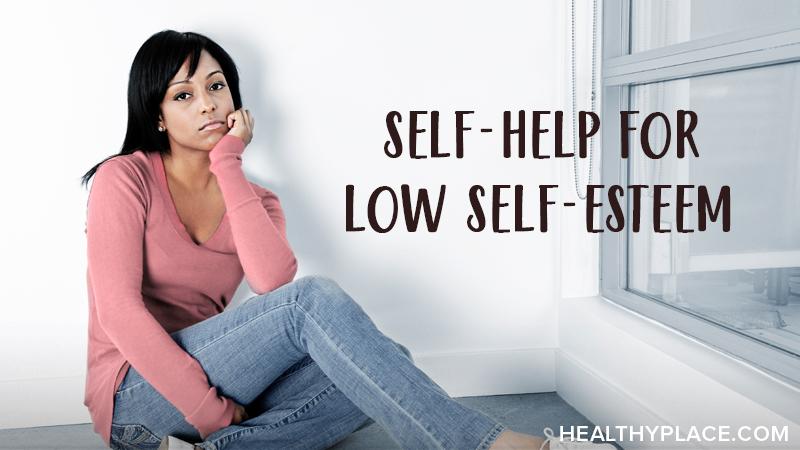Self-Help for Overcoming Low Self-Esteem
 Self-help for low self-esteem can give you the tools you need to overcome your confidence issues. Everyone experiences low self-confidence at some time or another. But for some people, these feelings of inadequacy are persistent and overwhelming. If this describes you, consider taking advantage of the many resources available to help you build confidence so you can achieve your goals.
Self-help for low self-esteem can give you the tools you need to overcome your confidence issues. Everyone experiences low self-confidence at some time or another. But for some people, these feelings of inadequacy are persistent and overwhelming. If this describes you, consider taking advantage of the many resources available to help you build confidence so you can achieve your goals.
Self-Help for Low Self-Esteem – 5 Effective Strategies
Self-help for low self-esteem represents an effective way to overcome a negative self-image and the problems that arise from it. Experiences in early childhood play a critical part in shaping our self-esteem. As we grow into adulthood, our perceptions of various experiences and interactions with others tend to reinforce the positive or negative self-esteem formed in childhood.
Strategies for overcoming low self-esteem:
- Identify your strengths and highlight them. We all have both strengths and weaknesses. Identify things you’re good at. Maybe you have a knack for explaining complex concepts to others. Perhaps you’ve always found organizing second nature or have been told you’re a great cook. You probably have several strengths. Think about the compliments you’ve received in the past. Listen to those you get in the future. These are true testaments to your personal strengths. Make a list of all the things you do well and remind yourself of these daily.
- Project a positive self-image. Your self-perception may not accurately reflect how others see you. You have the power (and the natural right) to decide how you see yourself. Likewise, you control how much you allow the opinions of others to negatively affect your self-esteem. Carry yourself with confidence (not arrogance) and, eventually, others will begin to treat you accordingly.
- Take negative feedback at face value. Don’t allow your inner voice to make negative feedback about one thing a general criticism about your abilities and worth in all areas associated with it. People with low self-esteem tend to generalize negative feedback. For example, if Tom fails a college math test, his inner voice may say things like: “I’m a moron. Who am I kidding? I’m so dumb, I don’t even belong in college.” Instead, he should think about it rationally: “I might have failed the test, but I did pretty well on the homework. Apparently, there are a few concepts I don’t understand as well as I thought. At least I know what I have to work on. I know I can do it.”
- Perfectionism is not your friend. The need for perfectionism can make a low self-esteem sink even lower. Nobody is perfect and everything you do doesn’t have to be flawless. Certainly, it’s ok to want to look your best or do the best you can on that important presentation, but perfection is unattainable. Put your best efforts into whatever it is you’re doing, but put a time limit on it. Once you’ve spent the time allotted, be done with it and move on.
- Retrain your inner voice. For people with low self-esteem, the inner voice is unfairly harsh, turns everything into a catastrophe, and illogically leaps to negative conclusions. For example, if someone turns you down for a date, don’t allow your inner critic to tell you that no one will ever be interested in you and that you’ll never find a romantic companion. Instead remind yourself that just because she turned you down doesn’t mean everyone will. Tell yourself that you know you’ll find the right person someday – one who is just as interested in you as you are in her.
These five tips provide you with a starting point for trying self-help for low self-esteem. But to really make a change, you’ll need self-help material that covers the many aspects of this complex problem. Look over some self-help books for low self-esteem. When you find one you like, work through the strategies and steps provided. Make healing your self-esteem a priority. It will take time and effort, but you can do it (Get Free Self-Help Books, EBooks and Workbooks).
Self-Help Books for Low Self-Esteem
There are countless books for low self-esteem available. Read through this list of books and workbooks for overcoming low self-esteem:
Overcoming Low Self-Esteem: A Self-Help Guide Using Cognitive Behavioral Techniques by Melanie Fennell
Self Confidence Secrets: How To Overcome Anxiety and Low Self Esteem with NLP by John Robert Daniels
Breaking the Chain of Low Self-Esteem, Second Edition, by Marilyn J. Sorensen
Self-Esteem, Third Edition, by Matthew McKay and Patrick Fanning
Ten Days to Self-Esteem, David D. Burns, M.D.
The Self-Esteem Workbook, by Glenn R. Schiraldi, Patrick Fanning, and Matthew McKay
The Self-Esteem Guided Journal: A 10-Week Program, by Matthew McKay and Catherine Sutker
Download free worksheets and other tools for self-esteem at Psychology Tools – Self-Esteem.
You find more self-help books for low self-esteem in your local library or bookstore or by conducting a Google search of your own. There’s so much help for low self-esteem available, you’re bound to find something you like and that will work for you.
APA Reference
Gluck, S.
(2021, December 17). Self-Help for Overcoming Low Self-Esteem , HealthyPlace. Retrieved
on 2026, January 13 from https://www.healthyplace.com/self-help/self-help-information/self-help-for-overcoming-low-self-esteem



